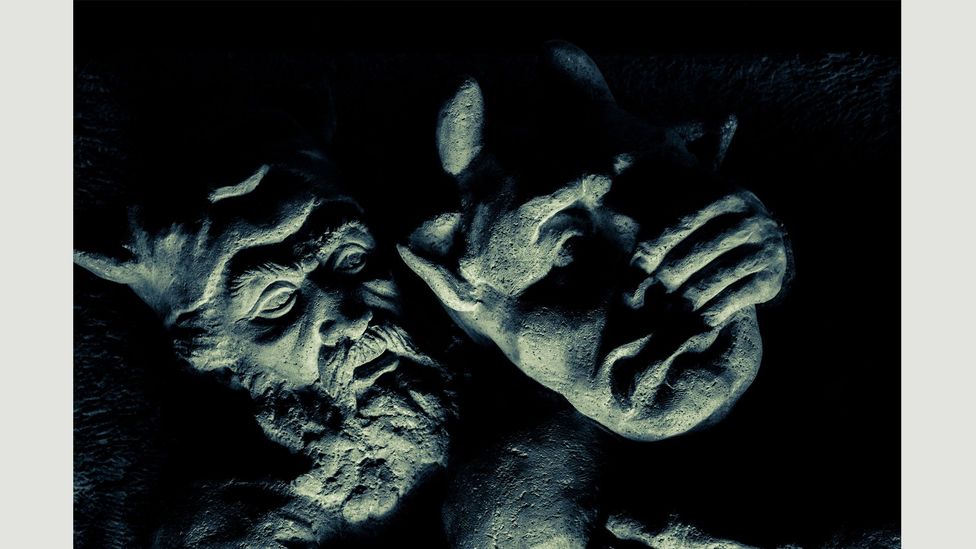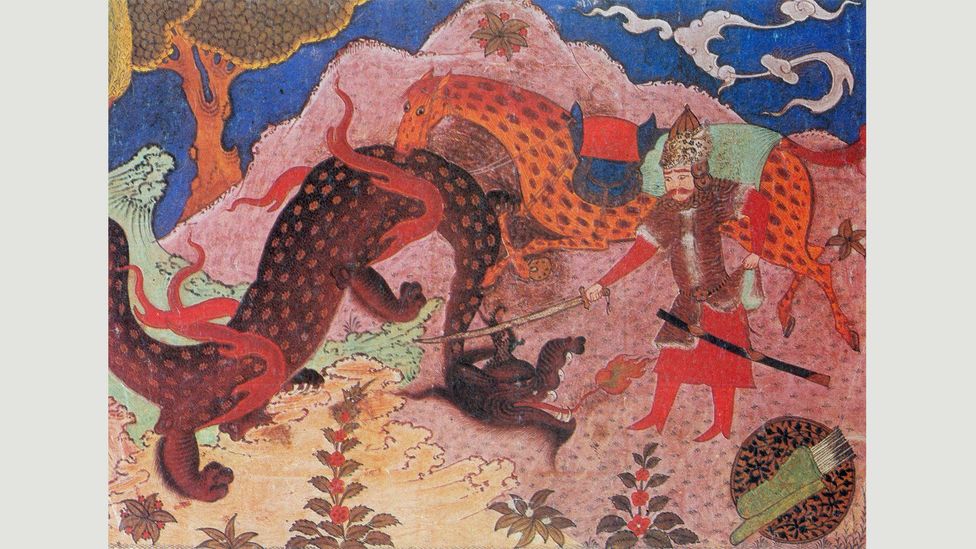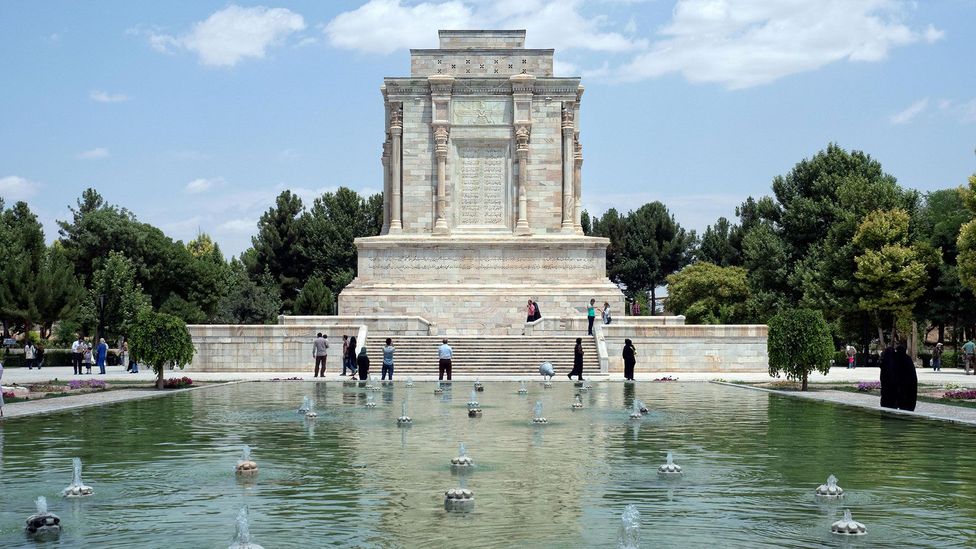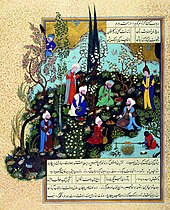
The Shahnameh is a compendium of indigenous, pre-Islamic myths, legends and historical episodes (Credit: Alamy)

The Shahnameh’s hero Rostam battles with demons, rescues kings and undergoes seven trials (Credit: Alamy)

Despite being unknown in his lifetime, the poet Ferdowsi is now one of the most celebrated writers in Iran – this tomb complex was built in his honour in Tus (Credit: Alamy)
*****
《列王紀選》(張鴻年譯, 1991)主要是選其中的"四大悲劇",參考該書的目錄。《列王紀選》
作者:菲爾多西.
譯者:張鴻年.
出版:北京: 人民文學. 1991/台北:光復書局
【本書目錄】
目 次
對真主的頌詞
對智慧的頌詞
創造宇宙
創造人類
創造太陽
創造月亮
贊揚先知及四大哈里發
關于搜集《列王紀》的材料
關于詩人塔吉基的故事
開始創作
對阿卜·曼蘇爾·穆罕默德·本·阿卜杜列扎格的頌詞
對瑪赫穆德國王的頌詞
1.故事的開端
(波斯的第一個國王凱尤 瑪爾斯當政30年)
西亞瑪克死于惡魔之手
胡山與凱尤 瑪爾斯去戰惡魔
胡山(胡山當政40年)
確立圣火節
塔赫姆列斯(降妖制魔的塔赫姆列斯當政30年)
賈姆席德(賈姆席德當政700年)
佐哈克和他父親的故事
惡魔為佐哈克作廚師
賈姆席德敗亡
佐哈克(佐哈克當政1000年)
佐哈克夢到法里東
法里東出生
法里東向母親詢問身世
佐哈克與鐵匠卡維的故事
法里東前去征討佐哈克
法里東見到賈姆席德的兩個妹妹
法里東與佐哈克的大臣的故事
法里東囚禁佐哈克
法里東(法里東當政500年)
法里東派欽達爾赴也門
也門國王對欽達爾的回答
法里東的三個兒子去見也門國王
薩爾夫施法術考驗法里東的三個兒子
法里東考驗自己的三個兒子
法里東三分天下
薩勒姆對伊拉治心懷妒意
薩勒姆與土爾派人向法里東下書傳話
法里東對他兩個兒子的回答
伊拉治去見兩個哥哥
伊拉治被兩個哥哥所殺
法里東得知伊拉治被害
伊拉治的女兒降生
瑪努切赫爾誕生
2.魯斯塔姆與蘇赫拉布的故事 頁 156~291
故事的開端
魯斯塔姆外出打獵
魯斯塔姆到達薩曼岡
薩曼岡國王之女塔赫米娜夜訪魯斯塔姆
蘇赫拉布降生
蘇赫拉布挑選戰馬
阿夫拉西亞伯把包爾曼及胡曼派至蘇赫拉布軍中
蘇赫拉布進襲白堡
蘇赫拉布大戰古爾德法里德
古什達哈姆上書卡烏斯
蘇赫拉布進占白堡
卡烏斯下書魯斯塔姆
卡烏斯怒貴魯斯塔姆
卡烏斯與魯斯塔姆率兵迎敵
魯斯塔姆手刃讓德拉茲姆
蘇赫拉布向哈吉爾訊問波斯將官姓名
蘇赫拉布襲擊卡烏斯大營
魯斯塔姆與蘇赫拉布之戰
魯斯塔姆與蘇赫拉布回營
蘇赫拉布打倒魯斯塔姆
蘇赫拉布慘死于魯斯塔姆手下
魯斯塔姆向卡烏斯求藥
魯斯塔姆痛哭蘇赫拉布
魯斯塔姆返回扎別爾斯坦
蘇赫拉布之母驚悉勇士被殺
3.夏沃什的故事
故事的開端
夏沃什的母親的故事
夏沃什出生
夏沃什從扎別爾斯坦返回
夏沃什母親去世
蘇達貝愛上夏沃什
夏沃什去見蘇達貝
夏沃什二去后宮
夏沃什第三次去后宮
蘇達貝欺騙卡烏斯
蘇達貝與巫婆施毒計
卡烏斯與群臣商議如何處理死嬰一案
夏沃什勇穿火陣
夏沃什懇求父王饒恕蘇達貝
卡烏斯得知阿夫拉西亞伯來犯
夏沃什領兵出征
夏沃什致信卡烏斯
卡烏斯給夏沃什的復信
阿夫拉西亞伯從惡夢中驚醒
阿夫拉西亞伯請祭司圓夢
阿夫拉西亞伯與群臣共商大計
格西伍前去會見夏沃什
夏沃什與阿夫拉西亞伯訂約
夏沃什派魯斯塔姆見卡烏斯面告軍情
魯斯塔姆給卡烏斯送信
卡烏斯把魯斯塔姆打發回扎別爾斯坦
夏沃什接到卡烏斯回信
夏沃什與巴赫拉姆和贊格商討軍情
贊格去見阿夫拉西亞伯
阿夫拉西亞伯寫信給夏沃什
夏沃什把軍隊交給巴赫拉姆
夏沃什會見阿夫拉西亞伯
夏沃什表演球藝
阿夫拉西亞伯與夏沃什前去打獵
皮蘭把女兒嫁給夏沃什
皮蘭對夏沃什提起法蘭吉斯
皮蘭與阿夫拉西亞伯議事
法蘭吉斯與夏沃什成親
阿夫拉西亞伯給夏沃什分封國土
夏沃什建造岡格城
夏沃什對皮蘭預言后事
阿夫拉西亞伯派皮蘭去收取賦稅貢物
夏沃什修建夏沃什城
皮蘭造訪夏沃什城
阿夫拉西亞伯派格西伍去看望夏沃什
夏沃什之予法魯德誕生
夏沃什打馬球
格西伍施挑撥離間計
格西伍再次去見夏沃什
夏沃什致函阿夫拉西亞伯
夏沃什致阿夫拉西亞伯的信文
夏沃什的惡夢
夏沃什對法蘭吉斯的勸告
夏沃什為阿夫拉西亞伯所執
法蘭吉斯哭求阿夫拉西亞伯
夏沃什被格拉維殺害
4埃斯凡迪亞爾與魯斯塔姆的故事
故事的開端
埃斯凡迪亞爾向父親要王位
卡什塔斯帕對兒子的回答
克塔永對埃斯凡迪亞爾的勸告
埃斯凡迪亞爾領兵赴扎別爾
埃斯凡迪亞爾派巴赫曼去見魯斯塔姆
巴赫曼會見扎爾
巴赫曼傳話給魯斯塔姆
魯斯塔姆對巴赫曼的回答
巴赫曼返回埃斯凡迪亞爾大營
魯斯塔姆會見埃斯凡迪亞爾
埃斯凡迪亞爾未邀魯斯塔姆前去作客
埃斯凡迪亞爾由于未邀魯斯塔姆赴宴而向他致歉
埃斯凡迪亞爾責魯斯塔姆出身不正
魯斯塔姆回答埃斯凡迪亞爾并歷數自己的世系及功勛
埃斯凡迪亞爾夸耀自己的出身
魯斯塔姆夸耀自己的業績
魯斯塔姆與埃斯凡迪亞爾對飲
魯斯塔姆回到自己宮中
扎爾對魯斯塔姆的勸告
魯斯塔姆與埃斯凡迪亞爾開戰
埃斯凡迪亞爾的兩個兒子死于扎瓦列與
法拉瑪茲之手
魯斯塔姆逃到山上
魯斯塔姆與家人共商對策
神鳥為魯斯塔姆出謀劃策
魯斯塔姆與埃斯凡迪亞爾再次開戰
魯斯塔姆射中埃斯凡迪亞爾雙眼
埃斯凡迪亞爾對魯斯塔姆的勸告
帕舒坦把埃斯凡迪亞爾的靈柩運回交給什塔斯帕
魯斯塔姆把巴赫曼送回波斯
我們三言兩語帶過:
The tragedy of Sohrab (BBC)
Rostam was unaware that he had a son, Sohrab, by Princess Tahmina. He had not seen the Princess for many years. After years without any real knowledge of one another, Rostam and Sohrab faced each other in battle, fighting on opposing sides. Rostam did not recognise his own son, although Sohrab had suspicions that Rostam may be his father.
They fought in single combat and Rostam wrestled Sohrab to the ground, stabbing him fatally. As he lay dying, Sohrab recalled how his love for his father – the mighty Rostam - had brought him there in the first place. Rostam, to his horror, realised the truth. He saw his own arm bracelet on Sohrab, which he had given to Tahmina many years before and which Tahmina had given to Sohrab before the battle, in the hope that it might protect him.
But he realised the truth too late. He had killed his own son, ‘the person who was dearer to him than all others’. This is one of the most tragic episodes of the Shahname.
****紐約時報Khaled Hosseini: By the Book
June 18, 2013你童年時喜歡哪個文學人物或主人公?菲爾多西(Ferdowsi)在11世紀寫的《國王之書》 (Shahnameh, or The Book of Kings)中偉大的悲劇武士索拉博(Sohrab)。那本書是波斯語經典詩歌皇冠上的一顆明珠。索拉博是偉大的武士魯斯塔姆(Rostam)的兒子,不 過兩人從未謀面。索拉博帶領軍隊出發,想給父親帶來榮耀,為父親贏得王位,但是戰鬥中的對手其實是他的父親。在故事的最後一幕,魯斯塔姆得知他親手刺成重 傷的人竟是自己的兒子,他抱住了奄奄一息的索拉博,那一幕給人的情感震撼真是無可比擬的。Do you have a favorite childhood literary character or hero?The tragic Sohrab, the great warrior from Ferdowsi’s 11th-century “Shahnameh” (“The Book of Kings”), one of the crown jewels of classic Persian poetry. Sohrab is the son of the great warrior Rostam, though the two have never met. Sohrab sets out with an army to bring glory to his father and win him the crown, only to come face to face with him in battle. The last scene of that particular story, Rostam holding Sohrab’s dying body, moments after he has learned the true identity of the man he has mortally wounded with his own sword, is unparalleled in the emotional wallop it packs.Khaled Hosseini: By the Book
June 18, 2013
《列王紀選‧魯斯塔姆與蘇赫拉布的故事》
*****



沒有留言:
張貼留言